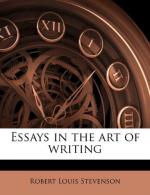In practice, I should add, the ear is not always so exacting; and ordinary writers, in ordinary moments, content themselves with avoiding what is harsh, and here and there, upon a rare occasion, buttressing a phrase, or linking two together, with a patch of assonance or a momentary jingle of alliteration. To understand how constant is this preoccupation of good writers, even where its results are least obtrusive, it is only necessary to turn to the bad. There, indeed, you will find cacophony supreme, the rattle of incongruous consonants only relieved by the jaw-breaking hiatus, and whole phrases not to be articulated by the powers of man.
Conclusion.—We may now briefly enumerate the elements of style. We have, peculiar to the prose writer, the task of keeping his phrases large, rhythmical, and pleasing to the ear, without ever allowing them to fall into the strictly metrical: peculiar to the versifier, the task of combining and contrasting his double, treble, and quadruple pattern, feet and groups, logic and metre— harmonious in diversity: common to both, the task of artfully combining the prime elements of language into phrases that shall be musical in the mouth; the task of weaving their argument into a texture of committed phrases and of rounded periods—but this particularly binding in the case of prose: and, again common to both, the task of choosing apt, explicit, and communicative words. We begin to see now what an intricate affair is any perfect passage; how many faculties, whether of taste or pure reason, must be held upon the stretch to make it; and why, when it is made, it should afford us so complete a pleasure. From the arrangement of according letters, which is altogether arabesque and sensual, up to the architecture of the elegant and pregnant sentence, which is a vigorous act of the pure intellect, there is scarce a faculty in man but has been exercised. We need not wonder, then, if perfect sentences are rare, and perfect pages rarer.
THE MORALITY OF THE PROFESSION OF LETTERS {11}
The profession of letters has been lately debated in the public prints; and it has been debated, to put the matter mildly, from a point of view that was calculated to surprise high-minded men, and bring a general contempt on books and reading. Some time ago, in particular, a lively, pleasant, popular writer {12} devoted an essay, lively and pleasant like himself, to a very encouraging view of the profession. We may be glad that his experience is so cheering, and we may hope that all others, who deserve it, shall be as handsomely rewarded; but I do not think we need be at all glad to have this question, so important to the public and ourselves, debated solely on the ground of money. The salary in any business under heaven is not the only, nor indeed the first, question. That you should continue to exist is a matter for your own consideration; but that your




